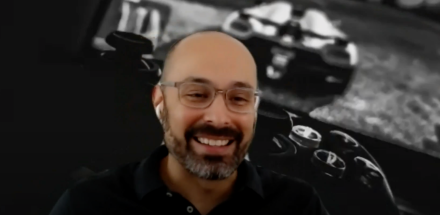The lead game designer of "Splinter Cell: Blacklist," Richard Carrillo recently spoke with Elon students in the “Game Dev Talks” event hosted by Elon’s Game Design Minor.
Richard Carrillo, the creative director at Sledgehammer Games, met virtually with students in Elon’s Game Design Minor program earlier this month to illuminate the design and development process.
On Sept. 16, Carrillo presented the talk, “Landing Your First Job in Game Design,” to the Game Design students.
Carrillo has over 15 years of experience in game design. He developed his skills at studios all over North America, including EA Tiburon, EA Chicago, EA Redwood Shores, KAOS Studios, Ubisoft Toronto and Sledgehammer Games Toronto. Notably, Carrillo worked as lead game designer for “Splinter Cell: Blacklist” and was the game director of “Starlink: Battle for Atlas.” With this knowledge and experience, Carrillo has dedicated himself not only to making great games but also to bettering hiring practices, improving the design culture and developing the skills of game designers across the industry. Carrillo is also an author of “The Role of a Great Game Designer,” a book that focuses on honing the game design skillset.

In the virtual lecture, Carrillo shared insights on portfolio preparation, requirements of a game designer and expectations of the game industry. Assistant Professor of Computer Science Pratheep Paranthaman hosted the event and several Game Design Minor students asked Carrillo about his experience in project management, the roles and responsibilities of a creative director and collaborative work.
“Through the Game Dev Talks event, we aim to create a platform for students to interact with game industry professionals and learn about the game development pipeline and challenges involved in it,” Paranthaman said.
In the talk, Carrillo highlighted the importance of understanding the process of creative problem-solving in game design.
“It generally comes down to what you hear in the industry is the 80/20 rule, and the 80/20 rule is that the first 80% of the development takes 20% effort and the last 20% of the development takes 80% of the effort. Getting it to cross the finish line is the hardest thing you will do in developing a game,” Carrillo said.
Game design minor alumni Mohammed Al Fadaam ‘23, Logan LaMont ‘23 and Dylan Pfeifer ‘23 also participated in the event. Al Fadaam is the co-creator of “Harmony Overture,” an action rogue-like game, which he completed as part of the game design minor capstone.
“It’s very interesting to see how game development teams always have very similar issues due to lack of communication which causes problems and how to solve those problems which ends up causing more confusion because everyone starts to pitch solutions without discussing what the main problem actually is,” Al Fadeem said.
Logan LaMont ‘23 mentioned that he was able to associate the instances from his Game Design Minor capstone project with several points mentioned by Carrillo in the Game Dev Talks.
“Hearing about the two main problems, creative problem solving and pitching and selling, was very interesting when thinking back to our project we did in the capstone. We ran into some of those issues and it is cool to see someone who has solved those problems on a professional level in order to create great products. Overall I thought the experience was great and very educational,” LaMont said.
LaMont is the co-creator of the post-apocalyptic visual novel “The Maneater and the Golden Teacher,” which was published on Steam in May.
“The Game Dev Talks are a great way to get insider information from the perspective of people in the games industry. This talk specifically focused on getting a job in the industry, which I found especially valuable as someone who will soon be looking for a job out of college,” said Dylan Pfeifer ‘23, who completed the minor.
Pfeifer is a co-creator of a horror survival game “Soul Janitor,” which his team completed as a part of the capstone project in the Game Design Minor. In this project, Pfeifer worked as a level designer and environment designer.
Elon’s Game Design Minor program takes a multi-disciplinary approach to the art of game design. The program welcomes students from all backgrounds to study, design and implement games. The minor includes a disciplinary sequence as a foundation for any number of roles a student might play on a game-building team.
To learn more about the Game Design Minor, click here.



